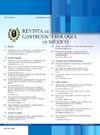Síndrome de náusea y vómitos crónicos e impacto en la calidad de vida
IF 1.5
Q3 GASTROENTEROLOGY & HEPATOLOGY
引用次数: 0
Abstract
Introduction and aim
Chronic nausea and vomiting syndrome is a disorder of gut-brain interaction that affects the productive-age population. Our aim was to determine the association of this disorder with quality of life, workplace performance, and socioeconomic impact related to gastrointestinal health.
Methods
A cross-sectional study on a Mexican population was conducted. The patients were classified as having chronic nausea and vomiting syndrome or other disorders of gut-brain interaction. A comparative analysis of quality of life, workplace productivity, annual medical consultations, and digestive health-related expenses was carried out, applying a logistic regression model.
Results
One thousand patients were included, 79.2% of whom met the criteria for a disorder of gut-brain interaction. Of the 792 patients, 10.3% presented with chronic nausea and vomiting syndrome. Said syndrome was associated with a negative impact on usual activities (OR 4.34, 95% CI 1.90-9.30, p ≤ 0.001), pain/discomfort (OR 2.09, 95% CI 1.31-3.33, p ≤ 0.001), anxiety/depression (OR 2.08, 95% CI 1.30-3.40, p ≤ 0.001), workplace presenteeism (OR 3.96, 95% CI 2.47-6.44, p ≤ 0.001), and workplace absenteeism (OR 2.54, 95% CI 1.52-4.16, p ≤ 0.001). There was also a higher number of annual medical consultations for digestive health (p = 0.013), without generating a greater annual expense due to digestive health (p = 0.08).
Conclusions
Chronic nausea and vomiting syndrome produces a negative impact on quality of life, which could be secondary to its symptomatology or its association with anxiety and depression.
慢性恶心呕吐综合征及其对生活质量的影响
本文章由计算机程序翻译,如有差异,请以英文原文为准。
求助全文
约1分钟内获得全文
求助全文
来源期刊

Revista de Gastroenterologia de Mexico
GASTROENTEROLOGY & HEPATOLOGY-
CiteScore
1.60
自引率
12.50%
发文量
102
审稿时长
12 weeks
期刊介绍:
La Revista de Gastroenterología de México es el órgano oficial de la Asociación Mexicana de Gastroenterología. Sus espacios están abiertos a los miembros de la Asociación como a todo miembro de la comunidad médica que manifieste interés por utilizar este foro para publicar sus trabajos, cumpliendo con las políticas editoriales que a continuación se mencionan. El objetivo principal de la Revista de Gastroenterología de México, es publicar trabajos originales del amplio campo de la gastroenterología, así como proporcionar información actualizada y relevante para el área de la especialidad y áreas afines. Los trabajos científicos incluyen las áreas de Gastroenterología clínica, endoscópica, quirúrgica y pediátrica.
 求助内容:
求助内容: 应助结果提醒方式:
应助结果提醒方式:


